新课标英语培训班小升初讲义
- 格式:docx
- 大小:101.27 KB
- 文档页数:7
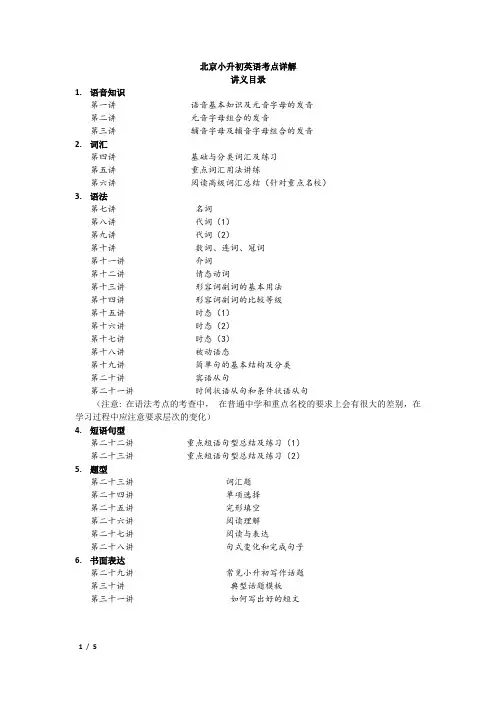
北京小升初英语考点详解讲义目录1.语音知识第一讲语音基本知识及元音字母的发音第二讲元音字母组合的发音第三讲辅音字母及辅音字母组合的发音2.词汇第四讲基础与分类词汇及练习第五讲重点词汇用法讲练第六讲阅读高级词汇总结(针对重点名校)3.语法第七讲名词第八讲代词(1)第九讲代词(2)第十讲数词、连词、冠词第十一讲介词第十二讲情态动词第十三讲形容词副词的基本用法第十四讲形容词副词的比较等级第十五讲时态(1)第十六讲时态(2)第十七讲时态(3)第十八讲被动语态第十九讲简单句的基本结构及分类第二十讲宾语从句第二十一讲时间状语从句和条件状语从句(注意: 在语法考点的考查中,在普通中学和重点名校的要求上会有很大的差别,在学习过程中应注意要求层次的变化)4.短语句型第二十二讲重点短语句型总结及练习(1)第二十三讲重点短语句型总结及练习(2)5.题型第二十三讲词汇题第二十四讲单项选择第二十五讲完形填空第二十六讲阅读理解第二十七讲阅读与表达第二十八讲句式变化和完成句子6.书面表达第二十九讲常见小升初写作话题第三十讲典型话题模板第三十一讲如何写出好的短文语音知识第一讲语音基本知识及元音字母的发音考点分析:在小学的英语学习中应该掌握最基本的语音知识,即掌握字母、字母组合在单词中的常见发音,学习识读音标,了解音节、重读等基本语音知识。
在小升初考试及统测中常见题型为语音的辨析。
考点重要性:语音知识的掌握不在于具体知识的记忆,而在于单词发音的练习,及对英语单词发音规律的领会和感悟,是进一步学习英语的重要基础,也是词汇量提升的重要保障。
音节音节的核心是元音,由一个或几个元音字母和前后的一个或两个辅音字母构成,如:he,box, black, at等;一个单词可以有一个音节,即单音节;也可以有两个音节,即双音节;或更多的音节,即多音节。
单音节: desk meet catch双音节: cle - ver (clever) sis-ter (sister) mo- ther (mother)多音节:com- pu- ter (computer) beau-ti-ful (beautiful) ci- ne- ma (cinema)一重读音节:在双音节或多音节必然有一个音节要重读,重读音节符号“' ”1. 单音节词都是重读音节2. .双音节词通常是第一个音节重读(前缀不重读)person ['pɜːs(ə)n] 重音在第一个音节per;pilot ['paɪlət] 重音在第一个音节pi;dislike [dɪs'laɪk] dis 前缀不重读。
![[全国版][小升初英语专题][第11讲 复合句]讲义](https://uimg.taocdn.com/03a318cf0066f5335b81215e.webp)
![[全国版][小升初英语专题][第10讲 句子]讲义](https://uimg.taocdn.com/65d22bea79563c1ec4da714f.webp)
第10讲句式1.在近几年全国各地的小升初考试中,对句式的考查比重越来越大,这个趋势值得重视,基本是以单选题和按照要求改写句子形式出现。
2.有关句式的考点主要是一般疑问句、特殊疑问句、there be句型、感叹句、反义疑问句、和祈使句的基本用法等。
3.对句式考察逐步加大的趋势,其实也是命题人侧重对考生英语实际应用能力的考查。
1.句式学习在小学阶段的分布图:2.小升初考试中将要对句式知识进行综合考查,本讲专题将对句式知识进行串讲。
你会用how many句型提问并回答图片中有多少草莓吗?一般疑问句和特殊疑问句一般疑问句1.定义:一般疑问句是询问某件事情是否属实的句子。
2.句子的特征:be动词,助动词或情态动词在句首,而回答往往是“Yes”或“No”,句末一般读作升调。
3.如何将陈述句变成一般疑问句?①如句中有以下三类动词,将其提到句首,句末打上问号即可。
I be动词(am、is、are、was、were)II助动词(do、does、did、have、had)III情态动词(can、must、will、may等)例:It was rainy yesterday.→Was it rainy yesterday?I have finished my homework.→Have you finished your homework?I can play the guitar.→Can you play the guitar?例题:将下列陈述句变为一般疑问句1.Tom's father can play the piano.2.She was a teacher last year.答案:Can Tom's father play the piano?Was she a teacher last year?②如果句中没有be动词、助动词或情态动词,则根据谓语动词的形式借助do的相应形式放在句首。
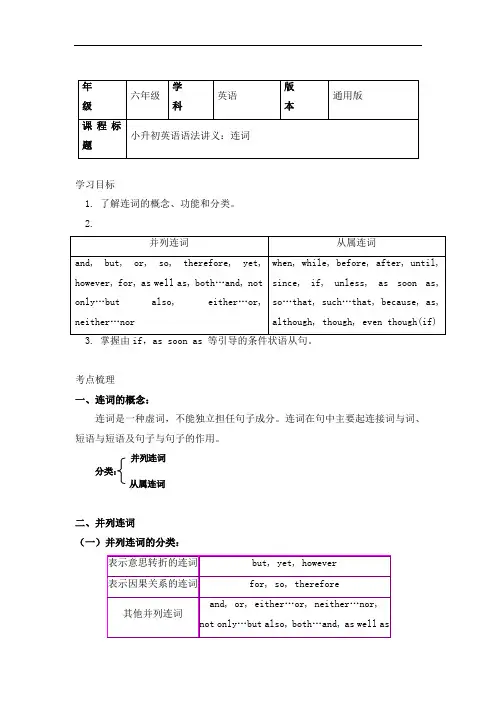
学习目标1. 了解连词的概念、功能和分类。
2.考点梳理一、连词的概念:连词是一种虚词,不能独立担任句子成分。
连词在句中主要起连接词与词、短语与短语及句子与句子的作用。
并列连词分类:从属连词二、并列连词(一)并列连词的分类:例句:He is only 12,but he is strong enough.他只有12岁,但他足够强壮。
She’ll be back either this week or next week. 她将在这周或下周回来。
I have a brother and sister. 我有一个哥哥和一个姐姐。
(二)并列连词的用法:1. 并列连词and和or:①and和or 是用得最多的并列连词,可以用于连接:a. 两个并列的动词:We were singing and dancing all evening. 整个晚上我们都在唱歌跳舞。
b. 名词、形容词等:This apple is big and red. 这个苹果又大又红。
Would you like fish or beef? 你想要点鱼还是牛肉?c. 两个并列的分句(句子):I said it and I meant it. 我说话算数。
②区别:and用于肯定句,or多用于否定和疑问句。
【提问】Do you want to live in the city __________the country?I won’t go to the park _______ the museum. I prefer to stay at home.③or用于肯定句,表示“否则”:例句:Don’t drive so fast, or you’ll have an accident. 别开这么快,不然你会出车祸。
【考题链接】(1)—I don't like chicken ___ fish.—I don't like chicken, ___ I like fish very much.A. and; andB. and; butC. or; butD. or;and答案:C解析:否定句中表并列关系时用or, but 在句中表转折。
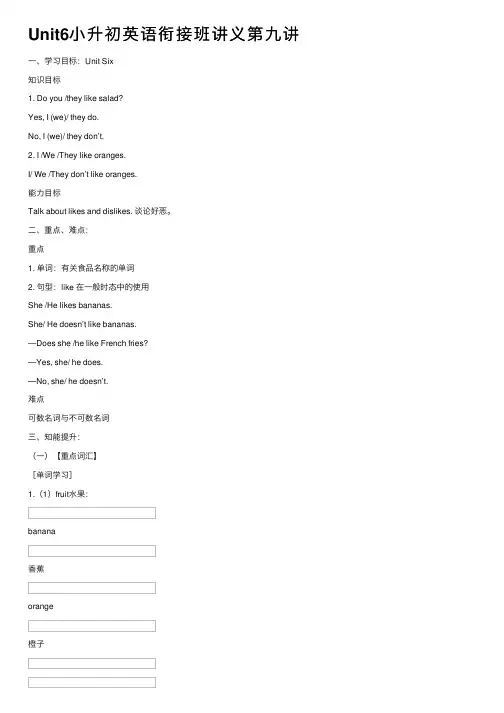
Unit6⼩升初英语衔接班讲义第九讲⼀、学习⽬标:Unit Six知识⽬标1. Do you /they like salad?Yes, I (we)/ they do.No, I (we)/ they don’t.2. I /We /They like oranges.I/ We /They don’t like oranges.能⼒⽬标Talk about likes and dislikes. 谈论好恶。
⼆、重点、难点:重点1. 单词:有关⾷品名称的单词2. 句型:like 在⼀般时态中的使⽤She /He likes bananas.She/ He doesn’t like bananas.—Does she /he like French fries?—Yes, she/ he does.—No, she/ he doesn’t.难点可数名词与不可数名词三、知能提升:(⼀)【重点词汇】[单词学习]1.(1)fruit⽔果:banana⾹蕉orange橙⼦梨strawberry草莓apple苹果(2)vegetable 蔬菜:tomato西红柿broccoli西兰花胡萝⼘(3)food ⾷物:French fries炸薯条Hamburger汉堡包egg[eg]鸡蛋鸡⾁甜⾷(4)three meals 三餐:breakfast, lunch, dinner.【考题链接】(2) A: What vegetables do you like?B: I like __________, __________ and __________.(3) I usually drink milk for __________ and __________.(4) A: Do you like fast food?B: Yes, I like __________, __________ and __________.答案:(1) A; H(2) C; E; G(3) B; F(4) D; I; J2. like [laik] v. 喜欢【⽤法1】like sb./ sth. 喜欢某⼈/某物,后接名词或代词。
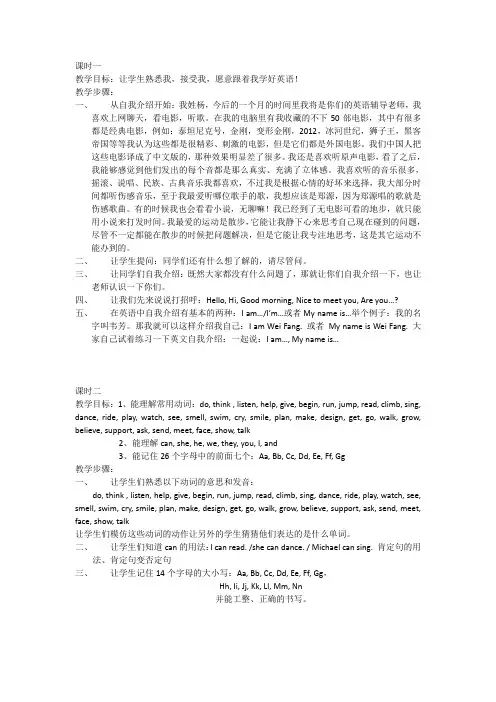
课时一教学目标:让学生熟悉我,接受我,愿意跟着我学好英语!教学步骤:一、从自我介绍开始:我姓杨,今后的一个月的时间里我将是你们的英语辅导老师,我喜欢上网聊天,看电影,听歌。
在我的电脑里有我收藏的不下50部电影,其中有很多都是经典电影,例如:泰坦尼克号,金刚,变形金刚,2012,冰河世纪,狮子王,黑客帝国等等我认为这些都是很精彩、刺激的电影,但是它们都是外国电影。
我们中国人把这些电影译成了中文版的,那种效果明显差了很多。
我还是喜欢听原声电影,看了之后,我能够感觉到他们发出的每个音都是那么真实、充满了立体感。
我喜欢听的音乐很多,摇滚、说唱、民族、古典音乐我都喜欢,不过我是根据心情的好坏来选择,我大部分时间都听伤感音乐,至于我最爱听哪位歌手的歌,我想应该是郑源,因为郑源唱的歌就是伤感歌曲。
有的时候我也会看看小说,无聊嘛!我已经到了无电影可看的地步,就只能用小说来打发时间。
我最爱的运动是散步,它能让我静下心来思考自己现在碰到的问题,尽管不一定都能在散步的时候把问题解决,但是它能让我专注地思考,这是其它运动不能办到的。
二、让学生提问:同学们还有什么想了解的,请尽管问。
三、让同学们自我介绍:既然大家都没有什么问题了,那就让你们自我介绍一下,也让老师认识一下你们。
四、让我们先来说说打招呼:Hello, Hi, Good morning, Nice to meet you, Are you…?五、在英语中自我介绍有基本的两种:I am…/I’m…或者My name is…举个例子:我的名字叫韦芳。
那我就可以这样介绍我自己:I am Wei Fang. 或者My name is Wei Fang. 大家自己试着练习一下英文自我介绍:一起说:I am…, My name is…课时二教学目标:1、能理解常用动词:do, think , listen, help, give, begin, run, jump, read, climb, sing, dance, ride, play, watch, see, smell, swim, cry, smile, plan, make, design, get, go, walk, grow, believe, support, ask, send, meet, face, show, talk2、能理解can, she, he, we, they, you, I, and3、能记住26个字母中的前面七个:Aa, Bb, Cc, Dd, Ee, Ff, Gg教学步骤:一、让学生们熟悉以下动词的意思和发音:do, think , listen, help, give, begin, run, jump, read, climb, sing, dance, ride, play, watch, see, smell, swim, cry, smile, plan, make, design, get, go, walk, grow, believe, support, ask, send, meet, face, show, talk让学生们模仿这些动词的动作让另外的学生猜猜他们表达的是什么单词。
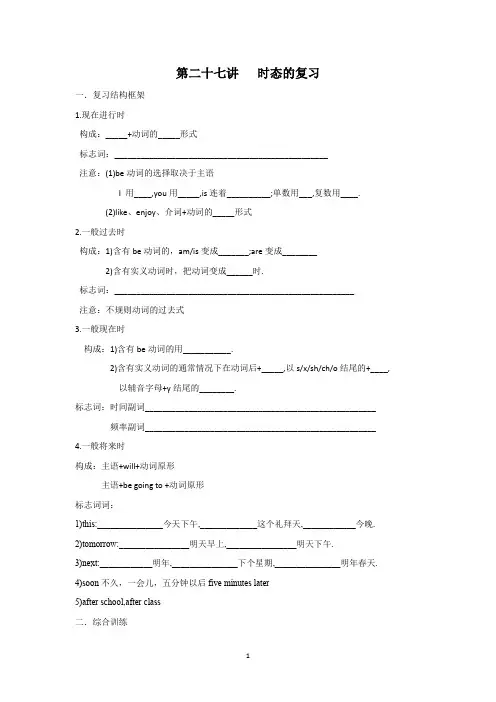
第二十七讲时态的复习一.复习结构框架1.现在进行时构成:_____+动词的_____形式标志词:_________________________________________________注意:(1)be动词的选择取决于主语I 用____,you用_____,is连着__________;单数用___,复数用____.(2)like、enjoy、介词+动词的_____形式2.一般过去时构成:1)含有be动词的,am/is变成_______;are变成________2)含有实义动词时,把动词变成______时.标志词:_______________________________________________________注意:不规则动词的过去式3.一般现在时构成:1)含有be动词的用___________.2)含有实义动词的通常情况下在动词后+_____,以s/x/sh/ch/o结尾的+____,以辅音字母+y结尾的________.标志词:时间副词_____________________________________________________频率副词_____________________________________________________ 4.一般将来时构成:主语+will+动词原形主语+be going to +动词原形标志词词:1)this:_______________今天下午,_____________这个礼拜天,____________今晚.2)tomorrow:________________明天早上,________________明天下午.3)next:____________明年,_______________下个星期,_______________明年春天.4)soon不久,一会儿,五分钟以后five minutes later5)after school,after class二.综合训练(一)单项选择1.Listen!The boy___in his room.A.singB.is singingC.singsD.will sing2.Both Tom and Tony______swimming yesterday.A.goB.wentC.is goingD.will go3.---What’s your sister doing there? ---______.A.She read newspapersB.She reads newspaperC.She is reading newspapersD.She will read a newspaper4. ---What _____you do last week?---I did something bad at school.A.wereB.doC.doesD.did5. They are going to __________a film.A.seeingB.seeC.seesD.saw6.Is your brother ___a book or___TV?A.reading,lookingB.reading,watchingC.watching,lookingD.looking,watching7. My cousin often_______us stories at night.A.tellB.speakC.tellsD.talk8.---Where’s Tom?---He____his homework at home.A.doB.doesC.is doD.is doing9. ____he____his homework every evening?A.Does;doB.Do;doesC.Is;doingD.Does;does10. Do you enjoy______in the country?A.livingB.to liveC.livedD.live11. What _________Amy going to do next weekend?A.isB.areC.amD.does12. ---Where____you just now? ---I____at school.A.were;wereB.were;wasC.was;wereD.was;was13.Be quiet!My baby________.A.sleepingB.sleepC.is sleepingD.are sleeping14. His ruler____in his bag now.But he____it here an hour ago.A.is;putsB.was;putsC.is;putD.was;put15. Mary ____a good time in the park yesterday.A.hadB.haveC.hasD.will have16. He often_____to the movie,but he didn’t____yesterday.A.go;wentB.goes;goesC.goes;goD.go;go17. My eraser____on my desk ten minutes ago.But it______there now.A.is;wasn’tB.was;isn’tC.is;isn’tD.was;wasn’t18. We’re going to take a trip___________.A.tomorrowB.yesterdayC.todayD. last week19. Where ____your father from?A.areB.isC.doD.be20.He_______late for school in the afternoon.A.is oftenB.often comesC.often ises often (二)用所给单词正确形式填空1. Look!My classmates___________(run)on the playground.2. He________(fly)a kite last week.3. What about__________(go)fishing this afternoon?4.---What does he often do on Saturdays? ---He often______(stay)at home.5.She________(sing)every day.6.We_________(leave)Beijing tomorrow.7.They ______(be)in England five years ago.8.Look!The baby__________(eat)an apple.9.His parents ________(be)teachers.10.Mr.White__________(not have)supper at home every day.11.David_____________(play)football with his friends next week.12.My mother____________(not go)shopping yesterday evening.13.We both like____________(sit)on the grass.14.Jim____________(not work)here soon.15.Lily and Lucy_________(not speak)English at home.(三)句型转化1. He’s going to Shanghai at 2 o’clock.(划线部分提问)__________________________________________2.He does homework at night.(否定句)__________________________________________3. I go to school by bus.(划线部分提问)__________________________________________4.My father is a businessman.(否定句)___________________________________________5.She put a book in her bag just now.(一般疑问句+肯答)____________________________________________________________________6.They are having an English class now.(划线部分提问)____________________________________________7.I was at home yesterday.(一般疑问句+否答)____________________________________________________________________8.He had an egg for breakfast.(否定句)____________________________________________9.He will pass the exam.(否定句)____________________________________________10.He listens to music on Monday mornings.(划线部分提问)_____________________________________________(四)阅读理解Three men came to London for a holiday. They got to a very big hotel(旅馆) and took a room there. Their room was on the fortieth floor. In the evening the men came back very late.“I'm sorry, ”said the waiter(服务员) of the hotel, “but our lifts(电梯) are not working now. You can’t use them. If you don’t like to walk up to your room on the fortieth floor, we hope you stay here on the first floor. ”“No. ”said Tom, one of the three men, “we don’t like to stay here. We are going to walk upto the room. ”Then he said to the other two men, “It is hard to walk up to the fortieth floor. But we can make it easier. We will tell jokes(笑话) and sang songs when we are going up.So they started to walk up to their room. They were singing and telling jokes to each other on their way to the fortieth floor. When they got to the thirtieth floor, they found they left the key(钥匙) to their room on the first floor.1. The waiter of the hotel asked them because the lifts didn’t work.A. to sleep on the first floorB. to stay on the first floorC. to walk up to the room2. The men on the way to the room.A. told stories and sang songsB. read jokesC. make jokes on each other3. They remembered they left the key on the first floor when .A. they were on the 40th floorB. they were on the 20th floorC. they finished three quarters of the way(五)完型填空。
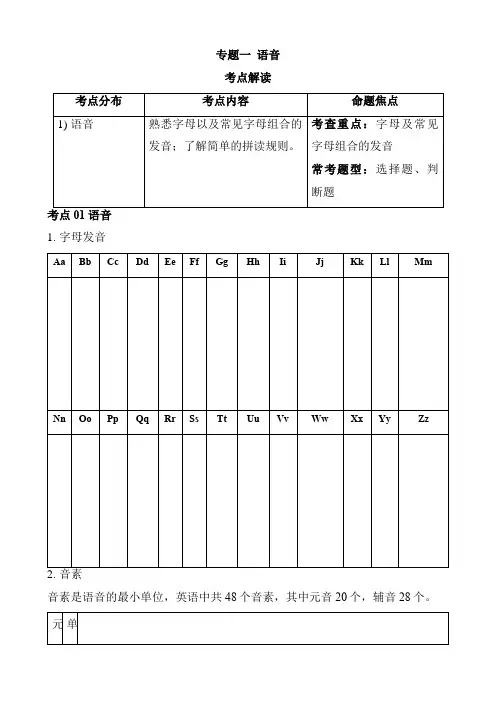
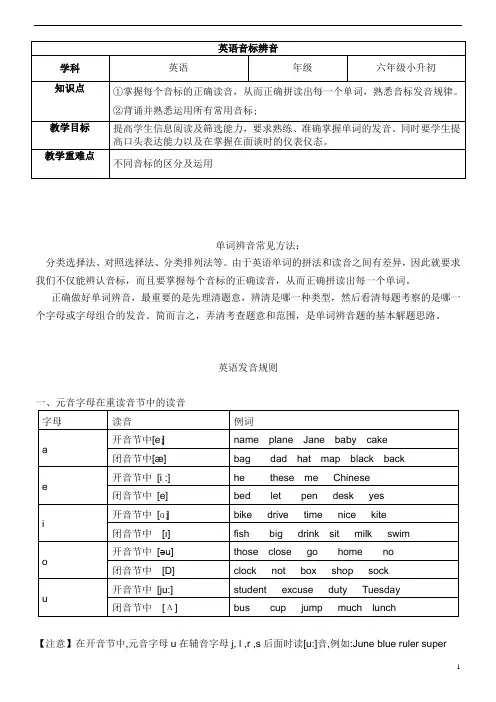
单词辨音常见方法:分类选择法、对照选择法、分类排列法等。
由于英语单词的拼法和读音之间有差异,因此就要求我们不仅能辨认音标,而且要掌握每个音标的正确读音,从而正确拼读出每一个单词。
正确做好单词辨音,最重要的是先理清题意,辨清是哪一种类型,然后看清每题考察的是哪一个字母或字母组合的发音。
简而言之,弄清考查题意和范围,是单词辨音题的基本解题思路。
英语发音规则一、元音字母在重读音节中的读音【注意】在开音节中,元音字母u在辅音字母j, l ,r ,s后面时读[u:]音,例如:June blue ruler super巩固练习:判断下列各词划线部分发音是否相同,相同的打“√”,不同的打“×”。
1、first her ( √)2、fifth there ( ×)3、today Saturday ( ×)3、say says ( ×)5、eat keep ( √)6、April May ( √)7、look cartoon ( ×)8、blow touch ( ×)二、元音字母在非重读音节中的读音【注意】动词中的a如果处在开音节位置,a读[eɪ]音,例如:operateu处在开音节位置,又在辅音字母j、l、r、s后面时,读[u(:)]音,例如:July influence February issue巩固练习:找出划线部分发音不同的选项。
( C )1. A. must B. public C. question D. cup( B )2. A. danger B. her C. litter D. mother( D )3. A. stay B. away C .today D. Saturday( A )4. A. great B bread C. ready D. head( B )5. A. dear B. bear C. here D. nearby( A )6. A. cook B. room C. food D. shoot三,元音字母在重读音节中的特殊读音巩固练习:选出划线部分读音与其它三个不同的单词( A )1. A.photo B. box C. clock D. lost ( D )2. A. thank B. think C. thing D. brother ( B )3. A. brown B. know C. now D. how ( B )4. A. food B. good C. school D. room ( A )5. A. blue B. bus C. lunch D. number四、-r音节元音字组在重读音节中的读音【注意】辅音字母r双写时,前面的元音字母不能与r构成-r音节,而是按重读闭音节的拼读规则发音,例如: carry sorry hurry-r音节在非重读音节中通常读[ә]音,例如:dollar teacher forget Saturday巩固练习:单词辩音(B )1. A. ruler B. her C. teacher(A )2. A. bear B. dear C. hear(B )3. A. hobby B. over C. pocket(C )4. A. front B. month C. orange(A )5. A. grass B. cage C. skate(B )6. A. recorder B. October C. sports(C )7. A. sign B. bike C. public(C )8. A. moment B. phone C. stop【注意】are ere ire ore很少出现在非重读音节中,ure在非重读音节中读[ә]音,例如:picture pleasure重读元音字母加r,再加非重读元字组时,重读元音字母应按-re音节拼读规则拼读,字母r读[r]音,例如: parent zero story during inspiring某些常用词及多音节词经常出现长音短化现象,例如:orange very American paragraph巩固练习:找出划线部分发音不同的选项。
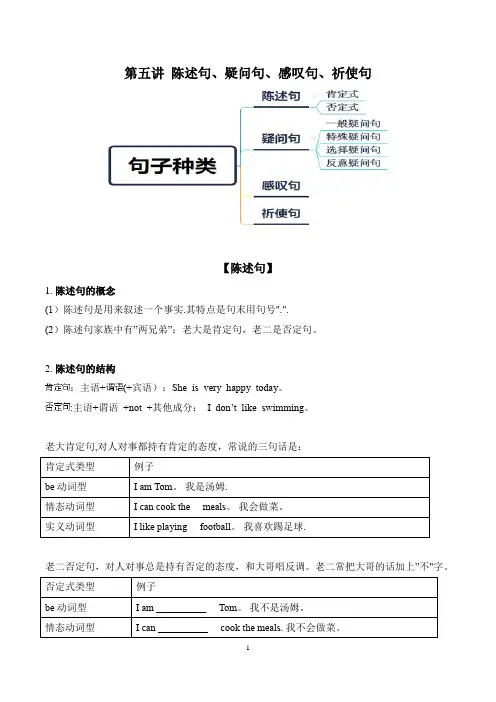
第五讲陈述句、疑问句、感叹句、祈使句【陈述句】1.陈述句的概念(1)陈述句是用来叙述一个事实.其特点是句末用句号".".(2)陈述句家族中有”两兄弟”:老大是肯定句,老二是否定句。
2.陈述句的结构:主语+(+宾语):She is very happy today。
:主语+谓语+not+其他成分:I don’t like swimming。
老大肯定句,对人对事都持有肯定的态度,常说的三句话是:老二否定句,对人对事总是持有否定的态度,和大哥唱反调。
老二常把大哥的话加上”不"字。
3.肯定句变为否定句(1)肯定句:主语+be+其他否定句:主语+be+__________+其他(2)肯定句:主语+情态动词+其他否定句:主语+情态动词+__________+其他(3)肯定句:主语+实义动词+其他否定句:主语+__________+__________+动词原形+其他注:第一人称改为__________,some要改为__________,and改为__________。
口诀:有be用be,有情用情;无be无情,借助动词。
【疑问句】一、一般疑问句(1)-—-Is Mary a Japanese girl?——-Yes,she is./No,she isn’t。
(2)Can Lily speak Chinese?--—No,she can’t。
/Sorry,I don’t know。
(3)Do you like English?--—Yes,I do./No,I don’t.1. 一般疑问句的概念:用yes/no(或相当于yes/no的词)回答,并怎么问怎么答(句首为情态动词,am/ is/are还是do/does)如:(1)-——Is your father good at swimming?Yes,he__________。
/No,he__________.(2)Does your brother often play games?Yes,he__________./No,he__________.2.肯定句变一般疑问句肯定句变疑问句三种句型:注:第一人称改为__________,some要改为__________,and改为__________。
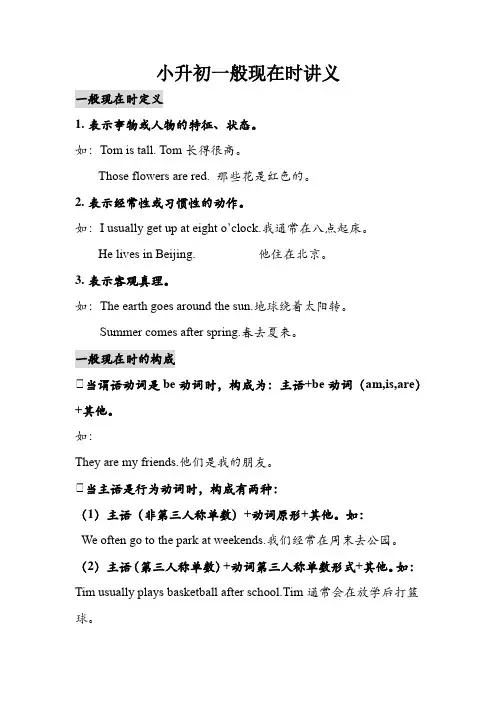
小升初一般现在时讲义一般现在时定义1.表示事物或人物的特征、状态。
如:Tom is tall. Tom长得很高。
Those flowers are red. 那些花是红色的。
2.表示经常性或习惯性的动作。
如:I usually get up at eight o’clock.我通常在八点起床。
He lives in Beijing. 他住在北京。
3.表示客观真理。
如:The earth goes around the sun.地球绕着太阳转。
Summer comes after spring.春去夏来。
一般现在时的构成①当谓语动词是be动词时,构成为:主语+be动词(am,is,are)+其他。
如:They are my friends.他们是我的朋友。
①当主语是行为动词时,构成有两种:(1)主语(非第三人称单数)+动词原形+其他。
如:We often go to the park at weekends.我们经常在周末去公园。
(2)主语(第三人称单数)+动词第三人称单数形式+其他。
如:Tim usually plays basketball after school.Tim通常会在放学后打篮球。
①句型变换(难点)如何把陈述句改为一般疑问句?可以按照以下步骤:1. 在陈述句中寻找is\am\are\can\will这几个单词I am a student.She is a beautiful girl.He is a strong boy.They are cute dogsI can swim very well.I will go to Beijing this summer.2.若句子中出现is\am\are\can\will几个单词,就直接把这几个单词放到句子的最前面,后面句子照抄,注意大小写字母的变化,并把句点改为问号。
I am a student.→Are you a student?(I am 是特殊的,通常用Are you…?进行提问)She is a beautiful girl.→Is she a beautiful girl ?He is a strong boy.→ Is he a strong boy?They are cute dogs.→ Are they cute dogs?I can swim very well.→Can you swim very well?(句子中出现I,都要改成you)I will go to Beijing this summer.→Will you go to Beijing this summer?3.若句子中没有出现以上几个单词,就要用助动词do\ does来进行提问,放在句子的最前面。
学科辅导讲义I will have to finish the work tomorrow.我明天必须完成这项工作。
(3)否定形式don't/doesn't have to表示“不必”,而mustn't则表示“不应该;禁止”。
e. g. You don't have to wait for me.你不必等我。
We mustn't cut in line.我们不应该插队。
7.情态动词should①表示义务,意为“应该;应当;最好”,比must委婉e. g. You should apologize to him.你应该向他道歉。
You should not eat so greedily.你不应该如此贪吃。
My teacher said (that)I should study harder.老师说我应该更加用功地读书。
②与疑问词连用,表示意外、纳闷、惊讶等,意为“究竟是……;到底是……”e. g. Why should you think that way? 你到底为什么会那么想呢?How should I know? 我怎么会知道?8.情态动词:need1. need是一个特殊的情态动词,意为“需要”。
它不仅能作为情态动词使用,还能充当一个实义动词。
如:Need I do my homework now?我必须现在做家庭作业吗?What do you need?你需要什么?2. need用作行为动词时,用法与其它行为动词相同。
如:You don't need to finish it right now.你不用现在就完成它。
We need to have a break.我们需要休息。
Do they need to know this?他们需要知道吗?3. need作为情态动词时,其过去式为need。
但need作为实义动词时,其过去式为needed.如:I'm sorry I need answer a phone call.So I couldn't talk with you yesterday.抱歉我昨天要听电话,没能跟你好好谈谈。
写出下列单词的复数形式:1.foot _________2. man________ 4. wife_________ 5. book_________6.roof_________7. zoo_________8. potato________9. child__________10.woman teacher_____________________ 11. girl student__________________特殊疑问句的分类及用法【知识梳理1】基本概念及构成1. 含义:特殊疑问句是指以Wh-(How)等特殊疑问词开头,对陈述句中某一部分提问的句子。
回答时不用Yes/No,而是用一个句子或者短语回答。
2. 结构:特殊疑问句=特殊疑问词+ 一般疑问句【知识梳理2】疑问词特殊疑问词意思对…提问What 什么东西Where 哪里地点When 何时时间Who 谁人Whose 谁的某人的东西(所属)Which 哪一个选择Why 为什么原因How 怎么样方式,方法由whot构成的特殊疑问短语What time 几点What colour 什么颜色What season 什么季节What animal 什么动物What size 什么尺寸What shape 什么形状由how构成的特殊疑问短语How many 多少(修饰可数名词)How much 多少(修饰不可数名词);多少钱How old 多大How far 多远How often 多久一次How long 多长时间How soon 多块【知识梳理3】解题步骤根据划线部分确定疑问词将句子变作一般疑问句去划线部分加问号【巩固练习】题型1:句型转化例1:We play games at five in He afternoon.__________________________________________例2:Alice has the violin lesson twice a week.__________________________________________例3:He didn’t come because he was ill.__________________________________________例4:I like the smaller apple.__________________________________________例5:I go to school from Monday to Friday.__________________________________________题型2:单选题例1:---____book is on the table? ---It’s Tom’s.A. WhoB. WhichC. WhereD. Whose例2:--- _________ is he? --- He is ten.A. WhatB. WhoC. How oldD. How many 例3:--- _______ kitchen is clean? --- Mary’s.A. Who’sB. WhoseC. WhoD. What例4:--- _______ on the river? --- There are some ducks.A. WhatB. WhichC. What’sD. Who一、根据句意,请从方框中选出合适的特殊疑问词来完成句子。
小升初辅导试题11学员编号:年级:课时数:学员姓名:辅导科目:学科教师:课程主题:写作指导、综合训练、口试模拟+6AU1-3复习巩固授课时间:学习目标教学内容内容回顾回顾6AU3基础主法知识点;课后作业讲评及上堂课口语对话内容回顾写作指导①A letter to Mom and Dad【范文】:June 1st,2011Dear Mom and Dad,How are you these days?I am here in Qingdao for a trip.I will be back in about a week.Qingdao is so clean and beautiful.I hope one day we can come here together.I want you to know I can take good care of myself.I hope you are both well.I miss you very much.Your son,Dick仿写:A letter to Mom and Dad_____________________________________________________________________________________________ _____________________________________________________________________________________________小升初综合训练一、配对。
( ) 1. You need it when you paint. A. football( ) 2. Boys like to play it. B. brush( ) 3. You do it if you're thirsty. C. eggplant( ) 4. It is a kind of vegetable. It is purple. D. drink( ) 5. What do the shop-keepers do? E. Saturday( ) 6. It is the day between Friday and Sunday. F. sell二、用恰当的介词填空1. A: Where are you________? B: Britain.2. Jane is an American girl. But she is ________Shanghai now.3. This is the classroom ________Class Four.4. There are some new cars ________the streets.5. Wei Wei can draw some pictures ________his friends.三、根据中文完成下列句子。
小升初语法讲义---代词知识点梳理代词的分类及用法教学重点代词的类别以及用法教学难点代词的运用代词的分类:英语中代词分为:人称代词、物主代词、反身代词、指示代词、不定代词、疑问代词等等。
1、主格用来作句子的主语、表语。
J_ofte n go shopp ing on Sun days.(星期天我常去购物)Are they from Brazil?(他们是巴西人吗?)That ' i坦就那么回事)2、宾格用来作及物动词或者介词的宾语。
Who teaches you, English this year?(今年谁教你们的英语?)Help me!(救救我!)3、人称代词作表语或者放在比较状语从句连词than或as之后时,可以用主格形式,也可以用宾格形式,口语中大多用宾格。
--Who is it?(是谁?)-It 17ms.(是我。
)4、三个不同人称同时出现,或者主语中包含我”时,按照“ you T he宀的顺序表达。
Both he and 丄are working at that computer company.(我和他都在那家电脑公司上班) -Who will go there?(谁要去那儿?)-You and me.(你和我)5、人称代词it除了可以指人指物之外,还可以表示时间、天气、温度、距离、情况”等含义,此外还可以作非人称代词”使用,替代作主语或者宾语的不定式、动名词或者名词性从句。
如:--What' s the weather like today?今天天气怎样?)一it' s fine.天气晴好) --What' s the time几点啦?)-' s 12 00. (12 点)It took him three days to clean his house.(打扫屋子花了他三天的时间)We fou nd it_very difficult to learn a foreig n Ian guage well.( 我们发觉要学好一门外语是非常困难的)【典例精析】_____feels happy every day.A. HeB. himC. his【答案】A【解析】此题选择人称代词he,此处缺的是主语,所以选择he。
学习目标:1. 了解实义动词形式的变化2. 了解主动语态和被动语态3. 掌握动词与to do,doing的固定搭配考点梳理:实义动词实义动词:含有实在的意义,表示动作或状态,在句子中能独立作谓语。
一、实义动词的变化:(1) 规则动词变化表:双写。
②s/es的读音规则:在清辅音后读[s];在浊辅音和元音后读[z];在[ s ]、[ f]、[z]、[tf]、[dv]后读[iz]。
③ed的读音规则:在清辅音后读[t];在浊辅音和元音后读[d];在[t]、[d]后读[id]。
(2) 不规则动词变化表:( 原形→过去式→过去分词)二、主动语态和被动语态:(1) 主动语态如何改写为被动语态:主动句:主语(人/物) + 谓语(及物动词) + 宾语(人/物) + 其他(动作的执行者) (各种时态形式) (动作的承受者)被动句:主语(人/物) + 谓语(及物动词) + by +人/ 物+ 其他(2) 被动语态的用法:①不知道谁是动作的执行者(即不知道谁做)时用被动语态,省略by短语。
如:A man was killed in the accident.一个人死于事故。
This window was broken yesterday. 这扇窗子是昨天被打破的。
②不说或众所周知是谁做时,用被动语态,省略by短语。
如:Rice is also grown in this place.这个地方也种水稻。
A railroad will be built here in three years. 三年之后这里将要修建一条铁路。
③强调动作的承受者,句尾加by短语。
如:It was written by Lu Xun.它(书)是鲁迅写的。
A pet dog is never killed by its owner. 宠物狗是不会被主人宰杀的。
三、to do 与doing记住下面的固定搭配:Aask sb. to do sth. 要求某人做某事agree to do sth. 同意做某事allow sb. to do sth. 允许某人做某事(sb.)be allowed to do sth. (某人)被允许做某事Bbe interested in doing sth. 热衷于做某事be afraid to do sth. 害怕做某事=be afraid of doing sth.be busy doing sth. 忙于做某事Cconsider doing sth. 考虑做某事can't stand doing sth. 不能忍受做某事Ddo one's best to do sth. 尽某人最大努力去做某事do well in doing sth. 在某方面做得好decide to do sth. 决定做某事Eenjoy doing sth. 喜欢做某事Fforget to do sth. 忘记去做某事forget doing sth. 忘记已做过的事【比较】He forgot to turn off the light. 他忘了关灯。
小升初寒假专题-------- 代词学问点梳理主格和宾格的用法主格宾格单数复数单数复数第一人I We me us称其次人称you you you you第三人称She/ he / it they Her /him/ it them留意:人称代词的挨次;当人称代词试单属实,遵循321原则。
当人称代词是复数时,遵循123原则。
形容词性物主代词和名词性物主代词形容词性物主代词名词性物主代词单数复数单数复数第一人称my our mine ours其次人称your your yours yours第三人称Her/ his/ its their Hers /his/ its theirs记忆口诀:形容词性物主代词+ 名词= 名词性物主代词留意:在表示a friend of….结构中;of后面用名词性物主代词A few / a little / few / little的用法1. few与few 都是用来修饰可数名词复数;a few表达确定的含义;few表达否定的含义;一般将a few翻译为一些;few翻译为几乎没有。
2. little与little都是用来修饰不行数名词;a little表达确定的含义;little表达否定的含义;一般将a flittle翻译为一些;little翻译为几乎没有。
留意:a little还可以翻译为“一个小的......" Eg: a little sheep 翻译为“一只小羊”,留意这里的sheep属于可数名词反身代词单数复数第一人称Myself ourselves其次人称yourself yourselves第三人称Herself / himself /itself themselvesteach oneself 自学by oneself 独自留意:在祈使句中,反身代词一律用yourself或者yourselves. 留意区分是单数还是复数。
复合不定代词的用法1. 当复合不定代词作主语时,将其看成第三人称单数. Eg: Everything is fine.2. 当复合不定代词与形容词放在一起时,形容词在后面。
新课标英语培训班小升初讲义LEKIBM standardization office【IBM5AB- LEKIBMK08- LEKIBM2C】小升初英语衔接1:国际音标1元音(20)前元音:[ i: ] [ i ] [ e ] []中元音:[:] []后元音: [a:] [] [u:] [u] [:] []合口双元音为: [ei] [ai] [] [au] [u]集中双元音为:[i] [][u]一:[ i: ]最美笑容音嘴唇向两旁伸开,成扁平行. 做微笑状,发[ i: ]长音。
小心翼翼注意:“:”是长音符号,长元音往往比它相应的短元音长两倍以上。
发音组合: e ee ea ie ei (eo ey i )代表单词: me he we evenbee feel sleep deep freeseat beat lead tea eat reasonsheepseemeatcoffeebeefpeachflea二:[ i ]最美笑容音发音要诀: 舌前部比[i:]稍低,比[e]高,舌尖抵下齿,嘴唇扁平分开。
牙床也开得稍大一些比[ i:]稍宽,比[ e ]窄。
上下齿之间的距离大约可以容纳一个小指尖。
短促发音组合: i代表单词: sit bit kick pick wish音标对比: [ i: ] [ i ]seat sitbeat bitsheep shipheat\leave\heal\sleep\feel\seek ship\hit\live\hill\slip\fill\sick三:[ e ] 温柔绵羊音发音要诀:舌尖抵下齿, 舌前部稍抬起, 舌后接近硬颚, 比[ i:] 低。
牙床也开得半开半合,比[ i:] 宽,整体做微笑状。
上下齿之间的距离大约相当于一个食指尖。
发音组合: e ea a代表单词:pen ten best beg egg netbread heavenmarry any many音标对比: [ i ] [ e ]sit setlift leftdid dead四:[] 恶心呕吐音发音要诀:牙床开的最大。
上下齿之间的距离大约相当于一个食指加中指。
发音组合: a代表单词: cap map bad mad bank thank lamp音标对比: [e] []beg bagmet matbed badPhrasespractising:keyandabee.2.Afishandapig.3.Ashipandasheep.4.Apigandship.beeonthepig.6.Afishinthemilk.7.Alittlepigontheseat.8.Apigandme.Sentencespractising:(1)Abigpigissleepingonaship.(2)Alittlefishisplayingwithabigfish.(3)Iseeafishandasheepsleepinginthetree.(4)Afriendinneedisafriendindeed.(5) AlovelySunday,makesmehappy.Dirtyshirts,makesmebusy.(6) Tedwashavingbread,happyinhisbed.Mumcameandsaid,nobreadinthebed.(7) Jackoftencomesback,hehasablackhat.Hesitsonamat.Cat’sinhishat.前元音小结英语中有四个前元音,即:[ i: ] [ i ] [ e ] []发前元音时必须注意:1) 舌尖要抵住下齿。
2) 舌前部向硬颚部分抬起。
3) 双唇不要收圆,发[ i: ] [ i ] [ e ] 时双唇平展,发[]时口形要张大,扁唇。
4) 唇形舌位保持不变,否则就要发成双元音。
语法及练习1be动词Be动词的用法:(1)口诀:我用am,你用are,is连着他她它,单数名词用is,复数全用are。
变疑问往前提,句末问号莫丢弃;变否定更容易,be后not莫忘记;疑问否定任你变,句首大写莫迟疑。
(2)肯定和否定句Iam(not)fromLondon.Heis(not)ateacher.Sheis(not)inthediningroom.Myhairis(not)l ong.Hereyesare(not)small.(3)一般疑问句AmIaChinese?Yes,youare.No,youaren’t.AretheyAmerican?Yes,theyare.No,theyar en’t.Isthecatfat?Yes,itis.No,itisn’t.用恰当的be动词填空。
1.I______aboy.______youaboyNo,I_____not.2.Thegirl______Jack'ssister.3.Thedog_______tallandfat.4.Themanwithbigeyes_______ateacher.5.______yourbrotherintheclassroom6.Where_____yourmotherShe______athome.7.How_______yourfather8.MikeandLiuTao______atschool.9.Whosedress______this10.Whosesocks______they11.That______myredskirt.12.Who______Ijeans______onthedesk.14.Here______ascarfforyou.15.Here______somesweatersforyou.16.Theblackgloves______forSuYang.17.Thispairofgloves______forYangLing.18.Thetwocupsofmilk_____forme.19.Sometea______intheglass.20.Gaoshan'sshirt_______overthere.21.Mysister'sname______Nancy.22.This______notWangFang'spencil.23.______DavidandHelenfromEngland24.There______agirlintheroom.25.There______someapplesonthetree.26._______thereanykitesintheclassroom27._______thereanyapplejuiceinthebottle28.There_______somebreadontheplate.29.There_______aboy,twogirls,threemenandtenwomeninthepark.30.You,heandI______fromChina._______acutebaby.agoodboy.beautifulgirl.34.They_________goodfriends.__________pupils.alittlemouse.StarterUnit1Goodmorning!1.记一记,比一比good/gud/adj.好的morning/'m:ni/n.早晨;上午Goodmorning!早上好!hi/hai/interj.(用于打招呼)嗨;喂hello/h'lu/interj.你好;喂afternoon/,a:ft'nu:n/n.下午Goodafternoon!下午好!evening/'i:vni/n.晚上;傍晚Goodevening!晚上好!how/hau/adv.怎样;如何are/a:/v.是you/ju:/pron.你;你们 Howareyou你好吗?I/ai/pron.我 am/m/v.是fine/fain/adj.健康的;美好的thanks/θks/interj.&n.感谢;谢谢OK/u'kei/interj.&adv.好;可以2.Pairwork(1):A:Goodmorning/afternoon/evening,Alice!B:Goodmorning/afternoon/evening,Hel en!(2):A:HowareyouB:I’mfine,thanks.3 扩展练习I am 1 girl. I am twelve. I am 2 school. 3 name is Zhang Hua. I am in 4 .I am 5 Row Five. Jim is 6 English boy. He is eleven. He and I 7 in the same class. He is my friend . We 8 good friends. 9 is my teacher, Miss Gao. 10 is a good teacher.( ). an B. the C. × D. a( ). at B. in C. and D. or( ). I B. My C. He D. You( ). Graded One, Class One B. grade one, class one.C. Class One, Grade OneD. class one , grade one( ). at B. or C. in D. and( ). an B. a C. the D. ×( ). is B. am C. be D. are( ). are B. am C. is D. be( ). What B. This C. He D. You( ) B. I C. She D. You。